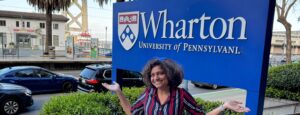When Camila Noordeloos, WG’18, was looking at executive MBA programs, she wanted to find one with a global focus. Growing up in Brazil with a French father and participating in foreign exchange programs in high school and college, she understood the value of a global perspective.
As she considered top programs, Wharton’s MBA Program for Executives in San Francisco stood out for its multiple global offerings, particularly the Global Modular Courses (GMCs). With eight to 13 courses offerings each year in Brazil, China, India, Israel, Italy, South Africa, and the United Kingdom, these three- to seven-day courses allow students to explore the opportunities and challenges of various business environments in the global marketplace.
Since the first GMC was piloted in January 2010, these global learning opportunities have been extremely popular among executive MBA students. Students from the full-time MBA program and select undergraduates also participate. In all, about 400 Wharton students and more than 100 students from partner universities participated in 12 GMCs this past academic year.
Camila was one of them. She decided to take a GMC on “Finance in Europe” in London with Prof. Bülent Gültekin, Prof. Bilge Yılmaz, and Prof. João Gomes. She and her classmates spent three days there, looking at current challenges in European markets and the Eurozone, the political economy of the European Union, alternative investments, and investment banking and cross-border mergers and acquisitions.
Camila already has plans to take advantage of more GMCs during her second year in the EMBA program. Here are three of the top benefits she gained from her GMC experience:
1. Inside insight on marketplace changes in the region
When Camila traveled to London for her GMC on Finance in Europe in March 2017, Prime Minister Theresa May was getting ready to trigger the two-year process for the United Kingdom to exit the European Union.
During their stay, Camila and her classmates had the opportunity to meet with many business and government leaders in the UK to discuss the benefits and challenges of that decision from a macroeconomic perspective. “It was eye opening to learn about that decision in person – not just through news reports — and really understand its impact on Europe on a deeper level,” she said.
2. The opportunity to engage with prominent regional and business thought leaders
GMCs enable Wharton students to talk with top executives and public leaders who are shaping the regional business environment and facing its unique challenges and opportunities every day.
“Being in the country for a Wharton GMC, you have incredible access to key leaders,” Camila said. “We had speakers like the former head of policy for Margaret Thatcher and many other leaders who probably wouldn’t be able to fly to campus for a two-hour lecture. ”

3. A dynamic, immersive learning experience
Blending Wharton classroom concepts with international immersion, Wharton GMCs expose students to new experiences. Learning about the emerging business issues affecting a country while you’re in the country makes a difference, Camila said.
“You can study an issue like Brexit in class and read news stories, but by visiting companies and talking to leaders, you really understand the issue on a much deeper level,” she explained. “It is this experiential learning that makes the GMCs so enriching.”
Bonus: Global Learning in the Classroom
In addition to the GMCs, Camila has found plenty of global perspectives on campus. “I knew Wharton’s EMBA program would be diverse, but there really are people here from all different countries and cultures. As you talk about issues in class, students share those perspectives,” she said.
“If we talk about a case where a company is trying to enter the market in India, a student who has actually done that will offer their perspective and then we discuss as a class. You don’t just learn from the professors, you also learn from your classmates who have real-world experience in other parts of the globe. That is a very valuable part of the program.”
Posted: August 21, 2017



















